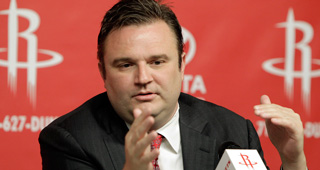Some time soon, I desperately want to see Daryl Morey run one of the major market teams with an owner who buys into that kind of plan.
Their attitudes align well because one of the hallmarks of Morey’s time with the Rockets has been retooling without stripping the team all the way down al a former Rockets exec and current Philadelpia 76ers GM Sam Hinkie.
While the Rockets have had problems of their own this summer, we have seen the major market teams with cap space deliberately and intentionally hurt their own future to a shocking degree over the last thirteen months.
At the outset, I should note that the reason I focus on the major markets (defined as New York and Los Angeles for this piece) is that salary cap space has more value to them than other franchises. The low individual maximum salary changes the decision-making process for truly elite player and the current CBA has actually made it even more advantageous for the large metropolises because the best free agents will nearly always hit unrestricted free agency after their second contract.
Combine players hitting a truly open market right before their prime and the way the system works and it should be apparent why these franchises should focus on flexibility and asset accumulation. Add in the fact that those markets can also add quality players on short, cheap contracts like Andrei Kirilenko, Nick Young, Darren Collison and Jordan Farmar just in the last year and you have another way to build a deep team without messing up future cap flexibility.
Instead, what we have seen from the Lakers, Knicks and Nets in the last year-plus has flown in the face of that style of management. The prime example of this flawed mentality came when the Lakers extended Kobe Bryant before he returned from injury, keeping him the highest-paid player in the entire NBA until the summer he turns 38. While the sentimentality of the extension is nice, the Lakers have to balance honoring a franchise great with making their next championship team and they ensured that it will not happen in those two seasons.
While some knocked Kobe for taking the contract, that rancor should have been aimed on the people who offered it instead since they made Bryant the one who would actively have to sacrifice in order for his team to have a better chance at adding a star. Signing him to the contract before his return from injury also showed players and other GM’s alike that the Lakers prioritized keeping Kobe happy over winning in the short term, not exactly the right message to send.
The Knicks followed a similar path by offering and then signing Carmelo Anthony a contract close to his full max that no other team could come close to. While I wrote about this decision at length earlier this week, cap space has more value for the Knicks than any other team considering how far away the Lakers are from dominance and how far the Nets and Clippers are from having workable cap space.
Carmelo is a good player not too far past his prime but it will be a hard sell to get an offensive star like Kevin Love in 2015 or Kevin Durant in 2016 to commit to a team with a talented volume scorer who should be the highest-paid player in the NBA from then until his mid-thirties. While the likely increase in the salary cap with the new TV deal will help make Melo’s deal less burdensome, having clean books would have increased the chances of getting two or more of the top-20 players in the league to MSG.
Even though their books were already jammed because of the Joe Johnson trade, Billy King and the Nets sabotaged their future by trading a boatload of useful assets for Paul Pierce and Kevin Garnett. Pierce has already left the team with only a second-round playoff appearance to show for it and Garnett likely has one year at most remaining in his illustrious career. What’s worse, Brooklyn has to pray that Deron Williams opts out of his insanely lucrative $22.33 million final season if they want to have the space to make a legitimate splash in the 2016 free agent class. We saw from Miami’s success that adding multiple stars at the same time can help lure a player less willing to leave his current team which almost definitely will be Kevin Durant’s attitude at that time.
In same ways most astonishingly, none of the Los Angeles or New York franchises have used the last year to accumulate any long-term assets. The closest any of them got was the Lakers scooping up a late first to take on Jeremy Lin’s final deal. The Nets have given up pieces to win now while the Clippers sold low on Eric Bledsoe to add short-term pieces not worthy of that kind of sacrifice. Each one of the major market teams owes a first round pick in one of the next two seasons with only the Lin pick coming back to any of the four in the same timeframe.
This all brings us back to Morey.
In general, he has done an excellent job avoiding the kinds of contractual pitfalls that have kneecapped the Lakers, Knicks and Nets in recent years. By largely giving out only max deals to worthy players and keeping the rest of the sheet remarkably clean in terms of bad contracts and long-term money, he maintained roster flexibility that made huge moves like trading for James Harden, signing Dwight Howard, and still having the space to add another max-level piece possible.
However, he made an interesting slip-up this summer with Chandler Parsons. Like many others, I assumed that he had a deal or understanding in place when the Rockets declined that super cheap player option, ideally with an understanding that included a discount because of the bargain basement salary Parsons would have had for the 14-15 season.
Instead, we saw the Rockets’ third-best player sign a three year offer sheet for his maximum salary with Dallas that forced their hand. While not identical to Carlos Boozer and the Cavs in 2004, that episode should have provided all the prologue Morey needed to maximize his offseason. If Parsons did not want to commit to the Rockets if they picked up his option, they could have picked it up and used him as a major asset either before or after deploying their cap space this summer. Even with that failure, the overall success of the Rockets can and should be part of the model New York and Los Angeles teams follow until they get their stars.
What ended up hurting Morey most in his swing for the fences was the fact that Houston did not check every single box for any of the major free agents. It was a good situation but not perfect enough to justify leaving for Bosh and not enough money for Carmelo. Putting those same signature clean books and ruthless accumulation of assets in a city players look to sign in even when their teams are shaky would provide one franchise the opportunity to line up a future dynasty before the new CBA changes the rules for player acquisition in 2017. Fortunately for the rest of the NBA, it looks like that will not happen in time.



